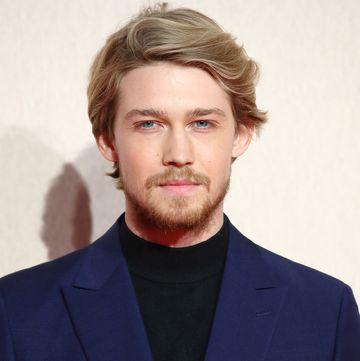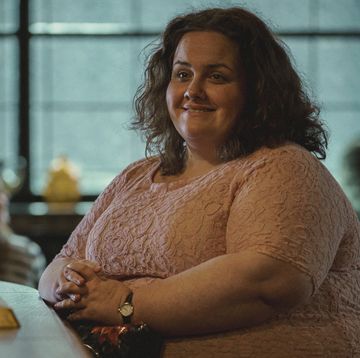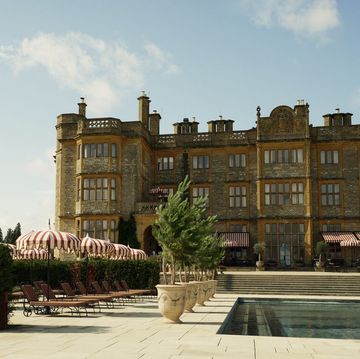Is it possible for a selfie to be a feminist act? It’s fair to say that the selfie has always been one filter away from the desperate, try-hard and uncool. But this year the selfie has gotten an unusually bad rep, when actually it might be more modern to embrace it — especially considering the fact that people in the UK took photos of themselves 1.2 billion times (!!!) last year.
There was the wave of music festivals (ground zero for cool) such as Coachella, Lollapalooza, Soundwave and Splendour in the Grass banning selfie sticks on the basis of being what Splendour called 'wands of narcissism.' And then the Met Gala banned all smart phone pics because the organisers allegedly hate them. Cannes followed right behind, with the festival director declaring them 'grotesque,' a word that many online trolls used to describe Kim Kardashian’s new selfie book, Selfish.
Fine, I get it. It can be frustrating trying to dodge someone’s photo-op when you just want to watch Rihanna in peace. I've been there. Like Susan Sontag famously said in ‘On Photography’— and I’m paraphrasing here — not every single moment needs to be documented all the time. But this year’s round of selfie hate feels a little more loaded than usual.
That’s mostly because selfies are largely viewed as a girl thing, thanks to Kimmy, Kendall, Khloe, Kris and the rest of the Krew, even though a study by HTC revealed that men are twice as likely to take photos of themselves and post them. What I find most puzzling, though, is this idea that the selfie is a no-go zone for intelligent, self-respecting adults. Never mind that everyone from world leaders to Oscar winners have taken them (31% of Britons have taken selfies of themselves in the last year alone according to Ofcom), there’s still this general feeling in the air that selfies are for narcissistic, flighty women.
I found myself thinking about this when Tyra Banks posted a #nomakeupselfie, saying: 'So...here I am. Raw. And there YOU are...looking at me, studying this picture. Maybe you're thinking, "Whoa, she looks ROUGH." And if you are, great! You deserve to see the REAL me. The REALLY real me. #RawAndReal.' Months earlier, a similar makeup-free Insta went viral. This time of skin cancer patient, Tawney Willhoughby, her face scarred and bloody from medical treatments. It was the most radical #nomakeupselfie I had ever seen. 'If anyone needs a little motivation to not lay in the tanning bed and sun here ya go! This is what skin cancer treatment can look like,' she posted. That hardly sounds like narcissism to me. The opposite in fact.
But even if Tawney was pulling an #iwokeuplikethis and flaunting her looks, as countless women now do, that's not necessarily a bad thing. There's something powerful about a woman celebrating her appearance, flaws and all. And there are plenty doing it. All you need to know is the right hashtag — each one a wormhole that leads to secret safe spaces where insecurities are being confronted and shed.
Scroll through the #flawless feed on your Instagram, for example, and you’ll see a stream of Beyoncé and Nicki Minaj posts for their video, Feeling Myself. But once you scroll past all of that, you’ll eventually get to women who aren't particularly famous celebrating what makes them look unique: a curvy, bare-faced woman, sports bra askew, after an afternoon hike, for example, or a fresh-faced teen beaming with a mouth full of braces. Meanwhile, #beautybeyondsize, links thousands of selfies of plus-size women boldly showing their bodies in various stages of undress with captions that have t-shirt worthy slogans like: ‘I’m not weird, I’m limited edition,' ‘Loving yourself is the greatest revolution,' and ‘Lose hate not weight.’
When I click through #bodyposi, #effyourbeautystandards and #honormycurves I find hundreds more of the same. Mind you, there are not so healthy communities posting selfies too. But why not focus on the empowering ones?
Two months ago, Lena Dunham posted a selfie of herself with Kim Kardashian’s book and declared, ‘I support experiments in female identity exploration/am a student of pop culture/ will not be shamed.' And while chances are high her post was in jest, there’s still a strong argument for taking the shame out of the selfie. Because when you sift through all the the Photoshop crops and the plastic-looking #thirstraps, there’s a growing number of women — famous and not — who are loving and owning their real faces and bodies. And why would we ever want to ban that?
Kenya Hunt is the Editor-in-Chief of ELLE UK. Her career spans working for some of the world's most influential women’s titles on both sides of the Atlantic from her post-graduate days as an Assistant Editor at the seminal magazine, Jane, to her time as Deputy Editor of Grazia UK and ELLE UK. As the founder of R.O.O.M. Mentoring, she advocates for greater diversity within the fashion industry by providing a supportive network for some of the many talented aspiring designers, journalists and image makers of colour London has to offer. In 2021, she was recognised by The British Fashion Council for her work and given a Global Leader Of Change Award at its annual Fashion Awards. An American based in London, she lives south of the river with her husband and two sons. Her critically-acclaimed book, Girl: Essays on Black Womanhood (HarperCollins/HQ), is out now.












